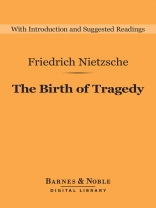This edition includes a modern introduction and a list of suggested further reading.
The Birth of Tragedy argues the importance of the tension between what Nietzsche called Apollonian and Dionysian forces. These contrasting forces enable a work of art to reveal the truth about human existence in such a way that we are able to bear the weight of its tragic wisdom. Nietzsche boldly combines aesthetics and psychology in a creative meditation on the sources of artistic inspiration. He also addresses the problem of nihilism in modern culture. The Birth of Tragedy offers an excellent point of entry into Nietzsche’s corpus.
A propos de l’auteur
Friedrich Wilhelm Nietzsche was born in the village of Röcken in Saxony on October 15, 1844. Nietzsche, whose father was a Lutheran pastor, spent a year as a theology student at the University of Bonn, before studying classical philology at the University of Leipzig. Despite poor health and desperate loneliness, Nietzsche managed to produce a book (or a book-length supplement to an earlier publication) every year from 1878 to 1887. In early January 1889, he collapsed in the street in Turin, Italy, confused and incoherent. He spent the last eleven years of his life institutionalized or under the care of his family.












